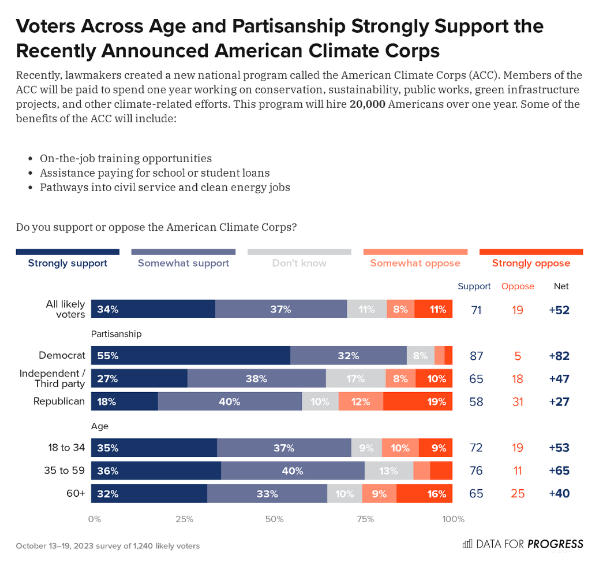Resources
Search below for resources covering the intersection of climate engagement, social science and data analytics.
RESULTS
Messy Conversations: How to Talk to Kids about Climate Change, with Mary Annaïse Heglar
How should we talk to kids about climate change? The world is beautiful, but the world is changing—and you can play a part in the change. Mary Annaïse Heglar's first book is out today, and it's a children's book about climate change. It's the first of three climate books Mary has coming out in the near future (the other two are a novel, called Troubled Waters, and an essay collection of Black writers on climate). She has been busy writing up a storm since we wrapped up Hot Take (and we've roped her into editing stories for Drilled, too).
Environmental Polling Roundup - February 16th, 2024
This post includes climate and environment headlines, data points, and key takeaways from recent public polls - including new polls of Western voters and young conservatives.
Environmental Polling Roundup - February 2nd, 2024
This post includes climate and environment headlines, data points, and key takeaways from recent public polls - including new polling on climate attitudes across generations and new polling on Americans’ top issue priorities.
Gen Z and Millennials both outpace other generations in their climate concern. Majorities of every generation say that they’re at least “somewhat” concerned about climate change, including overwhelming majorities of Gen Z Americans (85%) and Millennials (78%) as well as around three in five Gen X Americans (60%), Baby Boomers (59%), and Americans from the Silent/Greatest generations (63%).
Poll: Sen. Markey: An Expanded American Climate Corps Wins With Voters, Creates Jobs, and Fights Climate Change
Americans strongly support the recently announced American Climate Corps. The new American Climate Corps is a major step in the fight for our nation’s future and for a Green New Deal. The American Climate Corps is overwhelmingly popular across age and political party, and supported by 71 percent of voters — including more than half of Republicans. The support grows even stronger among voters under the age of 59.
Eco-anxiety is present for young Americans and young people around the world. Youth are turning this anxiety into activism. UK climate protesters went to prison after blocking roads and oil terminals. Just Stop Oil activists hurled soup at famous paintings. This guide describes other examples like these. (See pages 38-39 of the guide for the climate focus.)
Behind the scenes of Sunrise’s volunteer-led phone bank program
In the spring of 2020, Sunrise Movement had a goal of making 300,000 phonebank calls on six congressional primary races. Sunrise decided to create volunteer teams to manage other volunteers, liaise with campaigns, set goals, and develop strategy. The volunteer leaders of these teams took on a level of responsibility and autonomy typically reserved for staff. The team members took responsibility for setting goals, creating strategy and tactics, liaising with campaigns, and managing the work of thousands of other volunteers.
Poll: Concern for Climate Change Directly Informs Youth Civic Engagement
Young people who feel threatened by climate change and want government action are highly motivated to vote. Untapped potential among the 4 in 10 youth who believe in their ability to have influence on the climate issue: The largest group of youth identified in our analysis (40%) do not currently report being directly affected by climate change, but believe they have the ability to have influence on this issue. However, they are participating in civic actions (both on climate and other issues) at lower rates than other youth. These youth are more likely to be Black, from lower income households, and younger. A majority of youth (56%) do not identify as strongly Republican or strongly Democratic, and many are still undecided who they will vote for: Party affiliation and vote choice for two of the groups align with each of the two major parties. However, many unaffiliated youth were found across all groups, and in the two remaining groups that are not strongly Republican nor strongly Democratic, many youth are still undecided who they will vote for in the 2024 presidential election.
LCV Youth Climate Poll
Young Americans don’t believe the Biden administration has done enough to combat climate change or to hold oil and gas companies accountable. Young Americans particularly want to see the administration close outdated oil and gas pipelines. 64% of young Americans aged 18-34 support closing outdated oil and gas pipelines. 59% of young Americans aged 18-34 support preventing new oil drilling on federal lands and waters. 54% of young Americans aged 18-34 support halting the expansion of methane gas exports. President Biden is deeply underwater with young Americans aged 18-34. This group is twice as likely to say that Biden is doing a “poor” or “not so good” job as president (65%) as to say that he is doing a “good” or “excellent” job (32%). Biden is even further underwater with this group on his ratings for combating climate change (24% excellent or good / 59% not so good or poor) and for holding oil and gas companies accountable (15% excellent or good / 61% not so good or poor).
Youth and the 2024 Election: Likely to Vote and Ready to Drive Action on Key Political Issues
Climate change ranks among the top issues for young people in the 2024 election, and young people who prioritize climate change feel especially motivated to vote. When asked to choose their top three issue priorities, the cost of living is the dominant concern for this age group: the majority of young people (53%) cite the cost of living / inflation as a top-three issue. Climate change (26%), jobs that pay a living wage (28%), and gun violence prevention (26%) form the clear next tier of priority issues for young people after the cost of living / inflation. Importantly, the poll finds that youth who prioritize climate change are poised to play an outsized role in the 2024 election because climate-motivated youth are especially politically engaged relative to their peers.
Pagination
- Page 1
- Next page







